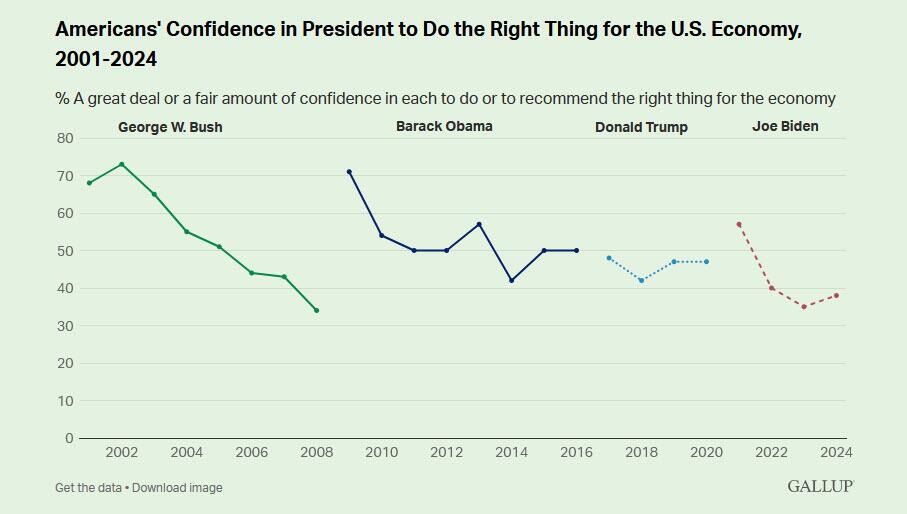By Megan Brenan of Gallup
With Americans less optimistic about the state of the U.S. economy than they have been in recent months and concern about inflation persisting, their confidence in President Joe Biden to recommend or do the right thing for the economy is among the lowest Gallup has measured for any president since 2001. But Biden is not alone in facing a skeptical public, as Federal Reserve Chair Jerome Powell, the Republican and Democratic leaders in Congress, and presumptive presidential nominee Republican Donald Trump garner confidence ratings below 50%.
Forty-six percent of U.S. adults say they have “a great deal” or “a fair amount” of confidence in Trump to do or recommend the right thing for the economy, while fewer say the same of Biden (38%), Powell (39%), and Democratic (38%) and Republican (36%) leaders in Congress.
To a large degree, this reflects partisanship; Democrats are confident in Biden, Powell and Democratic congressional leaders, while Republicans are confident in Trump and Republican congressional leaders. Partisans have little to no confidence in the opposing party’s leaders. While political independents are not overly confident in any of the leaders, they have the most confidence in Trump.
These findings are from Gallup’s Economy and Personal Finance poll, conducted April 1-22. During the poll’s field period, the Bureau of Labor Statistics released the latest Consumer Price Index data showing that inflation remains stubbornly elevated, though nowhere near the 40-year highs seen in 2022. After the poll was completed, Powell announced that interest rates would remain steady due to the current inflation rate.
Confidence in Biden’s Management of Economy Low Compared With Predecessors
Gallup has tracked confidence in presidents’ ability to do the right thing for the economy annually since George W. Bush took office in 2001. Bush, Barack Obama and Biden (to a lesser extent) enjoyed majority-level economic confidence ratings at the start of their presidencies, while the public’s confidence in Trump never rose above his initial 48% reading. Trump’s current rating is essentially tied with that of his last year in office.
Obama’s confidence ratings were at least 50% each year except for one (42% in 2014). Biden has fared much worse as confidence in his economic management dropped precipitously in 2022 from 57% to 40% amid sharply higher inflation, and it has been below 40% since then. Only Bush earned lower confidence from Americans than Biden has since last year — by the end of his second term, amid the Great Recession, when just 34% of Americans expressed confidence in his economic abilities.
Confidence in Powell Remains Low Historically
Powell’s latest economic confidence reading of 39% is statistically similar to last year’s 36%. Alan Greenspan, who served five terms in the position, inspired majority-level confidence for each of Gallup’s five readings between 2001 and 2005. In contrast, the two chairs of the Federal Reserve who followed Greenspan — Ben Bernanke and Janet Yellen — failed to register confidence ratings above 50%.
One reason Fed chairs typically engender less confidence than presidents is that the public is not overly familiar with them, and thus more likely to not offer an opinion on their leadership. This year, 16% do not offer an opinion on Powell. Historically, the average percentage not expressing a view on the Fed chair’s leadership has been 17%.
Below-Average Confidence in Democratic, Republican Congressional Leaders
The current economic confidence readings for both parties’ congressional leaders are statistically similar to last year’s readings but well below the historical average for each. Democratic leadership’s latest 38% confidence rating is near the all-time low of 34% recorded in 2023 and below the average of 46% since 2001. Republican leadership’s latest 36% rating is well above the 24% low for that group, in 2014, but significantly below the historical average of 43%.
Confidence ratings were last at the majority level in 2009 for Democratic congressional leaders and in 2003 for Republican congressional leaders.
Confidence in Economic Leaders Driven by Partisanship
Americans’ confidence in these key leaders is driven by partisans’ differing views. Broad majorities of Republicans express confidence in the economic competence of Trump (86%), their party’s presumptive presidential nominee, and 82% of Democrats do the same of Biden.
Democrats are more likely than Republicans to say they are confident in their own party’s congressional leaders (80% vs. 67%, respectively). Democrats (56%) are also more confident than Republicans (30%) in Powell’s handling of the economy. Few in either party are confident in the opposing party’s presidential candidate or congressional leaders.
Roughly one-third of independents say they are confident in Biden, Powell and both parties’ congressional leaders. Trump earns higher confidence from independents (45%).
Bottom Line
Americans’ assessments of the national economy are bleak, and they lack confidence in U.S. leaders’ ability to manage it properly. Democrats trust Biden and Powell on the economy, while Republicans trust Trump — but relatively few independents trust any of the current leaders who have a hand in managing the economy. The net result is that, unlike as recently as 2021, none of the key national figures who can influence the economy earns the trust of a majority of Americans.
Biden’s subpar rating could have significant electoral implications as not only does he have the lowest economic rating of any president seeking reelection since Gallup began tracking this in 2001, but independents trust his opponent more than him.
